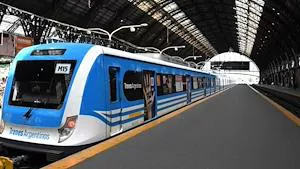Argentina’s National Railway Network Takes a New Step Towards “Open Access”
The Federal Government issues new regulations for the operation of railway services.

On Monday, April 5, 2021, Regulation No. 219/2021 of the Federal Transport Regulation Agency (the CNRT, after its acronym in Spanish) was published in the Official Gazette, approving the Railway Operators Registry Regulation.
The Railway Operators Registry Regulation sets forth the rules for passenger or freight railway servers in the National Railway Network.
- Backgrounds
Law No. 27,132 (the New Railway Law), which was passed in 2015 with broad political support, proclaims passenger and freight railways to be of public interest and a high-priority objective.
Thus, the New Railways Law provided for the operation of railway services to be migrated to an “open access” regime under which the existing railway infrastructure will be administered by the Federal Government while allowing for public and private players to provide passenger and freight railway services (Railway Services).
Subsequently, different regulations were issued to implement the “open access” regime, such as Presidential Decree No. 1027/2018, that regulated the New Railway Law, and Presidential Decree No. 1924/2015, through which the Registry of Freight and Passenger Operators (Registry of Operators) was created —in which all entities capable of providing Railway Services (Operators) are required to register—, and which granted authority to the CNRT to stipulate registration requirements.
- Main Provisions of the Railway Operators Registry Regulation
The Railway Operators Registry Regulation approved by Regulation No. 219/2021 of the CNRT:
- Includes a definition of Operator and requires that all Railway Services in the National Railway Network be provided by Operators registered in the Registry of Operators.
- Defines the regulatory framework applicable to Operators and classifies the different categories of Services they may provide and the relevant registrations that may be granted.
- Establishes general and specific legal, technical and economic requirements that Operators must meet based on how their service is categorized in order to obtain registration in the Registry of Operators and later maintain, amend or cancel it in the future.
- Sets forth the procedure to obtain registration in the Registry of Operators and outlines its effects, specifying that registration is not sufficient for performing Railway Services, as those services are also subject to the subsequent approval of the authority in charge of the infrastructure where the services will be provided and to compliance with applicable rules (e.g., at the federal level, the Ministry of Transportation and Administración de Infraestructura Ferroviaria Sociedad del Estado, a government-owned company).
- Stipulates the fee schedule for each type of procedure to be carried out within the Registry (e.g., initial registration, change of categories, etc.).
- Outlines the CNRT’s enforcement powers over Operators, which behaviors may constitute breaches of the Railway Operators Registry Regulation and the guidelines that the CNRT must follow in its evaluation –this in addition to the enforcement powers of the authorities in charge of the relevant infrastructure.
In addition, Regulation No. 219/2021 granted the status of Operator to the companies that currently provide Railway Services by means of a permit or concession granted by the Federal Government, by Operadora Ferroviaria Sociedad del Estado or by Provincial Governments, while establishing that the CNRT will require the necessary information to make their registration with the Registry of Operators effective.
- Preliminary Considerations
The issuance of the Railway Operators Registry constitutes an additional step by the Federal Government towards an “open access” system in Argentina’s National Railway Network, as designed by the New Railway Law.
Although the effective implementation of this “open access” system is still subject to the fulfillment of certain conditions (e.g., defining how concessions involving current operators will be granted —in a way that is respectful of their rights—, approval of the transition plan, etc.) and the issuance of operational regulations, the Railway Operators Registry allows interested companies to identify at least preliminarily the necessary requirements for registration.
Thus, it is very important to closely follow the regulatory evolution of the regime and the practices that the regulatory authorities establish to identify potential opportunities in this sector for both domestic and foreign players.
This insight is a brief comment on legal news in Argentina; it does not purport to be an exhaustive analysis or to provide legal advice.